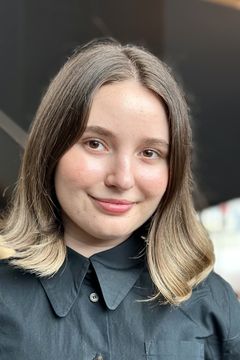Graduate Student Fellow Masha Lazou is developing computational methods for drug discovery

Masha Lazou is a third-year PhD student, advised by Diane Joseph-McCarthy, Professor (ENG), and Sandor Vajda, Professor (ENG), and a 2024 Hariri Institute Graduate Student Fellow. Lazou’s research is in developing computational methods to enhance the understanding of protein structure ensembles. Lazou received her bachelor’s degree in biomedical engineering from Boston University in 2022.
The Hariri Institute asked Lazou about her research:
Hariri Institute: Can you describe your research focus and its applications?
Lazou: My research focus is on investigating the computationally generated ensembles of protein structures. Protein structure solving is essential in drug discovery; however, wet lab approaches can be very time and cost consuming. New machine learning methods, such as AlphaFold2, are an absolute game changer. I work to understand the effectiveness of AlphaFold2 in predicting multiple conformations of proteins (since proteins are dynamic and they move a lot) and investigate how structural ensembles can be effectively utilized for drug discovery purposes.
Hariri Institute: How did you become interested in this? Was there something that inspired this area of interest?
Lazou: Growing up in Ukraine, I could see the disparity between Ukrainian healthcare and the healthcare systems abroad. This sparked my desire to study biomedical engineering with the goal of bringing my knowledge back to Ukraine to elevate the country’s biomedical field. At first, I was not sure what I wanted to focus on in biomedical engineering since the field is so broad. Upon coming to college, I quickly realized my love for computer science and became curious of how I could unite coding and biology. After some research, I discovered one of the PIs with whom I worked during my senior year of undergrad and now during my Ph.D.
Hariri Institute: What are the main goals or objectives of your research?
Lazou: The goals are to evaluate existing methods of protein conformational ensemble prediction as well as trying to improve on existing methods and find ways where conformational ensembles can be useful besides understanding the underlying protein function.
Hariri Institute: Has there been a recent development or finding that you find particularly exciting?
Lazou: I was very surprised to see that it is challenging to generate binding site pockets in different conformations even with AlphaFold2. It seems like AlphaFold2 model has a tendency of memorizing a certain conformation especially when the protein’s training set is heavily imbalanced.
Hariri Institute: What advice do you have for students entering the first year of a PhD program?
Lazou: For students choosing a lab, I suggest choosing a lab based solely on your interests. I think no matter how hard it gets every Monday I am excited to go into my lab because I get to do the things that I love. I think if something can get you through 5 long years in a Ph.D. program is love to what you do.
Hariri Institute: How do you plan on using this fellowship opportunity?
Lazou: Spending so much time on a computer, I think that I would benefit from a new one. The rest will go to conferences and learning experiences. I was accepted to a Computational Medicinal Chemistry School and am super excited that I will get a chance to go and learn about drug discovery from pharmaceutical experts.
The Hariri Institute’s Graduate Student Fellowship recognizes outstanding PhD Student Researchers at BU and supports their development through collaboration with other Graduate Student Fellow cohorts to organize and support Institute-sponsored events and through internal networking between fellows and the wider Hariri Institute community. Learn more about current Graduate Student Fellows and the program here.
